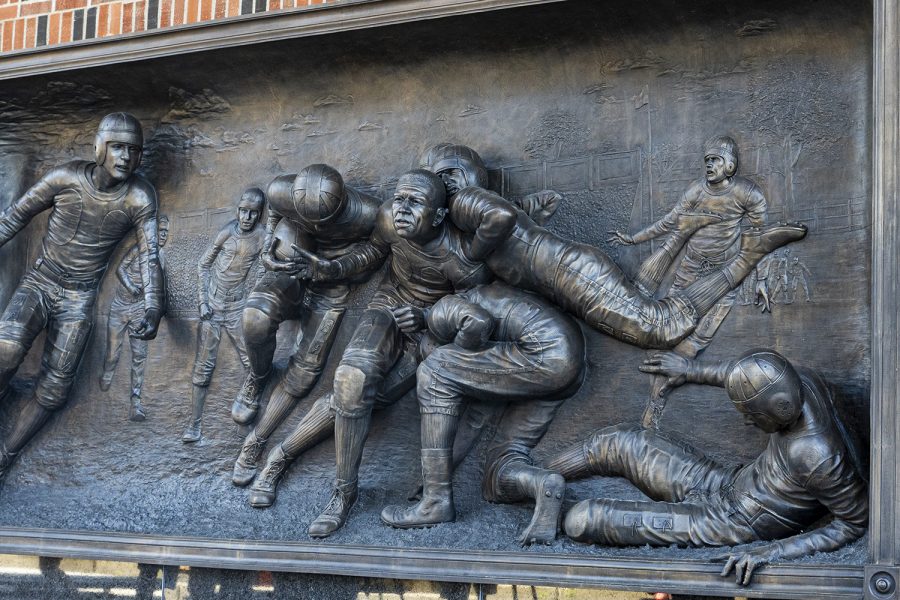Regents approve UI’s request to name field at Kinnick Stadium after Duke Slater
Slater played football at Iowa from 1918-21 and became the first Black athlete at the school to earn first-team All-American honors.
The statue of Duke Slater is seen outside the north end zone of Kinnick Stadium during Iowa football media day on Friday, August 9, 2019. (Shivansh Ahuja/The Daily Iowan)
July 28, 2021
The playing field inside Kinnick Stadium has a new name: Duke Slater Field.
The state Board of Regents approved by consensus the University of Iowa’s request to name the playing field at Kinnick Stadium after Slater, the first Black athlete at Iowa to earn first-team All-American honors, during its Wednesday meeting in Cedar Falls.
“The University of Iowa believes the naming of Duke Slater Field at Kinnick Stadium is the proper capstone to honor a remarkable Hawkeye and a remarkable citizen of our state,” the UI’s senior vice president of finance Rod Lehnertz said during the meeting.
Per the UI, permanent recognition of of Duke Slater Field will be installed on the playing surface later this summer.
The Associated Press reported last week that the UI planned on naming the field after Slater.
“We are proud and honored to name the Kinnick Stadium playing field as Duke Slater Field,” athletics director Gary Barta said in a release. “Much has been written about Duke’s incredible history and the boundaries he broke. With the addition of the relief statue as part of the north end zone project and his recent induction into the Pro Football Hall of Fame, this was a proper capstone to honor a remarkable Hawkeye. As the description on the relief statue states, ‘His life in football and beyond was defined by triumph and relentless breaking of boundaries.’”
Slater played tackle at Iowa from 1918-21, earning first-team All-Big Ten honors in his final three seasons with the Hawkeyes. Slater earned first-team All-American honors in 1921, becoming the first Black player at Iowa to earn that distinction. In 1921, Slater helped the Hawkeyes achieve a 7-0 record, including a victory over Notre Dame that snapped the Fighting Irish’s 20-game winning streak.
The UI revealed a bronze statue honoring Slater and the 1921 Iowa team in 2019.
The statue became the second campus artifact to honor Slater, along with Slater Residence Hall. It remains the only residence hall on campus named after a student-athlete. Slater, as a Black person, would not have been permitted to stay in the dorms during his time as a UI student, per university practices at the time.
Slater became one of five members of the inaugural Iowa Sports Hall of Fame class and a member of the inaugural College Football Hall of Fame class in 1951.
After leaving Iowa, Slater became the NFL’s first Black lineman. The Clinton, Iowa, native played 10 professional seasons, earning All-Pro honors six times. In 1927 and 1929, Slater was the only Black player in the league.
RELATED: Kinnick-Slater Stadium: A not-so-new name proposal
Slater, who died in 1966 at age 67, will be inducted into the Pro Football Hall of Fame as part of the Centennial Class in August. Slater and former Hawkeye Alex Karras will be recognized for their Hall of Fame induction during Iowa’s Oct. 9 home game against Penn State.
During his NFL offseasons, Slater took law classes at the UI, eventually earning a law degree from the university in 1928. Slater was elected Chicago’s second Black judge in 1948, and in 1960 became the first Black judge to serve on the Superior Court of Chicago. He moved to the Circuit Court of Cook County in 1964.
Former UI President Willard “Sandy” Boyd proposed naming the university’s stadium Kinnick-Slater Stadium in the 1970s, as previously reported by The Daily Iowan. That proposal would have honored both Slater and Nile Kinnick, the 1939 Heisman Trophy winner who died during a training flight while serving in the U.S. Navy during World War II.
Boyd told The DI last summer the Campus Planning Committee rejected the proposal in 1972 because it claimed to disapprove of the hyphenation.
Iowa State’s Jack Trice Stadium is the only football stadium named after a Black player across the Power Five conferences.



